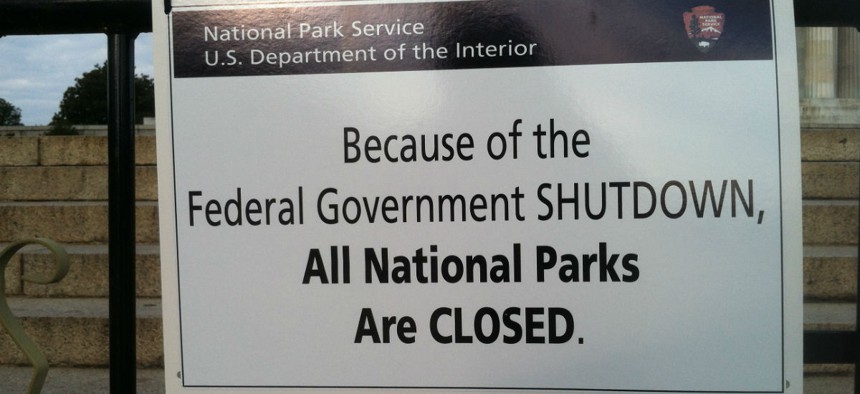Shutdown Advice for Contractors: If a Stop-Work Order Comes, Stop Work
Professional Services Council prepares members for possible lapse in appropriations, while optimistic government will stay open.
Congress’s progress on its 12 annual spending bills for fiscal 2019 means “we’re in pretty good shape ” for funding federal agencies, David Berteau, president and CEO of the 400-member Professional Services Council, told his contractor members in a webinar on Wednesday.
Congressional appropriators have reported all spending bills from committee, with a half-dozen approved by full chambers, Berteau noted, lawmakers’ most productive pace in 12 or 13 years. But with only 11 legislative days left before the fiscal year ends Sept. 30, there is a “slim chance” of all 12 getting through conference or a major negotiated omnibus deal, which is why it is “prudent” for agencies and contractors to prepare for the possibility of a lapse in appropriations. Getting all the bills signed by Oct. 1 “is subject to a lot of decisions affected by both votes and politics,” Berteau said.
“The reason we [present preparation guidance for our members] is not to predict a [shutdown]--we hope there is no government shutdown,” added Alan Chvotkin, PSC’s executive vice president and counsel, but because reacting to agency closures “is an arcane area.”
Both mentioned President Trump’s recent tweets in which he suggested he might favor a shutdown if Congress fails to fund his long-sought southwestern border wall. (At the White House briefing on Wednesday, Press Secretary Sarah Sanders declined to give a specific answer on shutdown possibilities, saying only, “We want to see Congress actually do its job, especially on immigration.”)
The PSC, which runs its own Government Shutdown Resource Center, laid out the steps observers can follow if indicators of a coming shutdown appear. “There is no one-size-fits-all circumstance for all shutdowns,” Berteau said. “Whatever circumstance or plan of action you have, it changes,” so companies have to track things “agency by agency, contract by contract, task by task. And no news isn’t necessarily good news.”
Federal employees, Chvotkin added, “even senior ones, are likely to have no insight,” since everyone is waiting for guidance from the Office of Management and Budget. The notice to agencies to begin preparations usually comes about a week before a potential lapse in appropriations, he said, referring members to the existing contingency plans each agency files with OMB.
Once OMB sends an actual directive to shut down operations—absent a continuing resolution from Congress to give itself more time to agree on spending levels—much of the government’s activity stops. The exceptions are “sovereign acts” to protect safety of people or public property (which don’t involve contractors, Chovtkin said), plus presidential core duties, activities funded through multi-year authority and revolving funds, such as the Modernizing Government Technology Act fund.
The Congressional Budget Office in July sent the House Budget Committee a breakdown of which funds of interest are affected based on previous data, Berteau noted. About 51 percent of the budget is discretionary, the rest remaining spendable under multi-year authority and “no year funds” that don’t expire.
Under most contracts, a shutdown precludes the authority to do the work, and limited resources hinder a company’s ability to offset the impact, Berteau said. But “a contract validly entered into before a lapse of funding for which the funding [came] prior to the lapse is allowed to continue—unless it requires a government employee who is unavailable or access to shuttered government facilities,” PSC said.
The “triggering event” for contractors is a stop-work order from an agency (the Federal Acquisition Regulation says it can’t last longer than 90 days). “If you are not directed by the government to stop, you must continue to perform,” PSC advised. But companies receiving a stop-work order must enforce it with vendors and subcontractors.
Agency employees, including contracting officers, under a shutdown are usually not available to approve payments, accept delivery or provide access to a federal facility, particularly one in a classified setting, PSC noted. A contractor could continue on a “nonseverable” contract, such as a study due in six months, but not on “severable” work such as facility maintenance. “Award dates might slip,” Chvotkin said, option periods can expire; bid submission dates may change; and orders under indefinite delivery, indefinite quality contracts can be delayed.
A program manager’s contract that gets frozen has a “cascading effect” on such agencies as the Defense Contract Audit Agency, the Defense Contract Management Agency, the Defense Finance and Accounting Service and their civilian counterparts, PSC said. A shutdown will also impact the regular schedule of contractor debriefings and bid protests decided by the Government Accountability Office. “But deadlines are not automatically extended.”
An appropriations lapse means no new awards for programs, the effects of which vary a bit by type of contract, Chvotkin said.
Contractors are “generally prohibited from working at risk, even if you want to,” Berteau said. “Letting it go is hard for people to do, because that’s what they do for a living.” Agencies cannot use contractors to augment or supplement their work, and they can’t be asked to work “at risk or in temporary unfunded status.”
Most contractor employees, during a shutdown, must simply stay home, and any work done is at risk of the company not being reimbursed.
To mitigate costs and maintain cash flow, companies are advised to assign staff work on other revenue-producing contracts, training or vacation. The last option is furloughs, Chvotkin said. Companies with employees on standby for a federal contract don’t usually take on additional work.
Companies are advised to pay attention to the state and federal Worker Adjustment and Retraining Notice laws requiring notice of layoffs to the workforce, and their union contracts. They should track all their expenses traceable to the shutdown and submit claims to the government within 30 days after the agencies reopen.
(Image via Flickr user National Parks Conservation Association)
NEXT STORY: Should I be Honest In My Performance Review?




